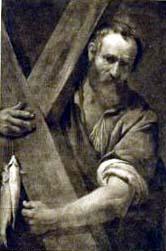
Name Meaning: strong, manly
Patronage: Achaia; Amalfi Italy; anglers; Berchtesgaden, Germany; Burgundy; diocese of Constantinople; diocese of Grand Rapids, Michigan, USA; fish dealers; fish mongers; fishermen; gout; Greece; Lampertheim, Germany; maidens; old maids; Patras Greece; Russia; Scotland; singers; sore throats; spinsters; University of Patras; unmarried women; women who wish to become mothers
Representation: fish; fishing net; man bound to a cross; man preaching from a cross; preacher holding some fish; Saint Andrew's cross; saltire (x-shaped) cross
Died: circa 60 AD (during the time of Nero's persecutions)
Saint Andrew was the first disciple to Our Lord Jesus Christ. Born near Bethsaida in Galilee, he was a fisherman along with his brother, Saint Peter.
Andrew was a disciple of John the Baptist, until John proclaimed Jesus as greater than he, “Behold, the Lamb of God”. Then Andrew, along with another disciple of John the Baptist, Saint John the Apostle, began to follow Jesus. When Jesus turned and saw them following Him, he asked what they were looking for and their reply was that they wanted to see where He was staying. So, He had them accompany Him to where He was staying, and they stayed with Him that day. Andrew then went and found Simon Peter and said to him, “we have found the Messiah”, then Andrew took Peter to Jesus. Thus, it is rightfully said, that Andrew led people to Jesus, both before and after the Crucifixion, and I might add, that he was the FIRST disciple to lead another to Jesus, as he led his brother Simon Peter to the Messiah.
Andrew and Peter returned to their business of fishing and their everyday lives, and Jesus came to them, and said, “Follow Me, and I will make you fisher's of men”, and from that day, they left their former lives behind and began following Jesus Christ.
It was Andrew who at the feeding of the multitude, pointed out the boy with the loaves and fishes in John 6:5-9: When Jesus therefore had lifted up his eyes and seen that a very great multitude cometh to him, he said to Philip: Whence shall we buy bread, that these may eat? And this he said to try him: for he himself knew what he would do. Philip answered him: Two hundred pennyworth of bread is not sufficient for them that every one may take a little. One of his disciples, Andrew, the brother of Simon Peter, saith to him: There is a boy here that hath five barley loaves and two fishes. But what are these among so many?
Andrew was among those whom the Lord appeared to after His resurrection, and also was present at His Ascension into The Heavenly Kingdom. After the Descent of the Holy Spirit, Andrew preached in many places according to the writings of The Early Church Fathers, among them: Cappadocia, Galatia, Bithynia, Byzantium, Thrace, Macedonia, Thessaly, and Achaia. There is also a tradition (which some say is unfounded) that when he preached in Russia, he reached as far as Kiev in the Ukraine, and possibly Poland. There is also a tradition that he preached in Ethiopia as well.
Nevertheless, Andrew soon went to Patras, a city of Achaia, where he was violently persecuted and pressed by the proconsul Aegeas to offer sacrifice to the gods and idols. Andrew's answer to him was as follows: "I daily offer sacrifice to God; not the flesh of oxen, nor the blood of rams, but an unspotted Lamb; and although all the faithful may have partaken of His flesh, yet the Lamb remains as before He was offered, alive and undivided." Aegeas was enraged, and threw Andrew into prison, the next day had him scourged, and once again tried to force him into sacrificing to the gods and idols, and once again, Andrew refused. The proconsul Aegeas then condemned Andrew to be put to death by crucifixion. Upon seeing the cross, Andrew's reaction was one of joy, and he embraced it saying: "O good cross, that was adorned with the limbs of Christ, thee have I long desired; thee have I fervently loved; thee have I continually sought. Now thou art made ready for me, according to the wish of my heart. Take me away from men, and restore me again to my Master, that through thee I may come to Him Who through thee has redeemed me."
The cross used to crucify Andrew was a saltire or decussate cross (an X shaped cross), now known as Saint Andrew's cross. Andrew was not nailed to the cross, but was tied to it in order to increase and prolong his suffering. Andrew preached from this cross for two days to 20,000 people before being restored to his Master. His Feast Day in both the Latin and the Greek Churches is November 30. He is the Patron of both Scotland and Russia.
From a homily on the Gospel of John by Saint John Chrysostom:
After Andrew had stayed with Jesus and had learned much from him, he did not keep this treasure to himself, but hastened to share it with his brother Peter. Notice what Andrew said to him: "We have found the Messiah, that is to say, the Christ." Notice how his words reveal what he has learned in so short a time. They show the power of the master who has convinced them of this truth. Andrew's words reveal a soul waiting with the utmost longing for the coming of the Messiah, looking forward to his appearing from heaven, rejoicing when he does appear, and hastening to announce so great an event to others. To support one another in the things of the spirit is the true sign of good will between brothers, loving kinship and sincere affection.
